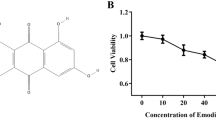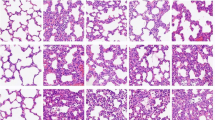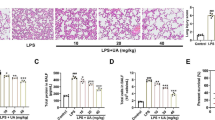Abstract
Objective and design
This study aimed to investigate the anti-pulmonary inflammation effect of emodin on Wistar rats with lipopolysaccharide (LPS)-induced acute lung injury (ALI) and RAW264.7 cells through the mammalian target of rapamycin (mTOR)/hypoxia-inducible factor-1α (HIF-1α)/vascular endothelial growth factor (VEGF) signaling pathway.
Subjects
Wistar rats and RAW264.7 cells were studied.
Treatment
LPS was used to induce inflammation in rats or RAW264.7 cells and emodin was given once a day before LPS stimulation and continued for a certain number of days.
Methods
Lung tissues and bronchoalveolar lavage fluid (BALF) were collected for the in vivo experiment, while cells and supernatant were collected for the in vitro experiment. Pathological changes in the lung tissues were assessed by hematoxylin and eosin staining. The levels of inflammatory factors, including TNF-α, IL-1β, and IL-6, were determined by enzyme-linked immunosorbent assay. The expression levels of p-mTOR, HIF-1α, and VEGF proteins were measured by Western blot analysis and immunohistochemistry. The mRNA levels of p70S6K, eIF4E-BP1, and eIF4E were measured by quantitative polymerase chain reaction.
Results
Emodin ameliorated pathological changes and infiltrated inflammatory cells in LPS-induced ALI. It also significantly reduced the expression of inflammatory factors, including TNF-α, IL-1β, and IL-6, in BALF and downregulated the expression of p-mTOR, HIF-1α, and VEGF proteins in the lung tissues. Similar anti-inflammatory effects and the downregulation of the mTOR/HIF-1α/VEGF signaling pathway were found in RAW264.7 cells. The mRNA levels of p70S6K, eIF4E-BP1, and eIF4E also decreased in the macrophages.
Conclusion
Emodin alleviated LPS-induced pulmonary inflammation in rat lung tissues and RAW264.7 cells through inhibiting the mTOR/HIF-1α/VEGF signaling pathway, which accounted for the therapeutic effects of emodin on ALI.






Similar content being viewed by others
Change history
03 April 2020
In the original publication of the article
References
Matthay MA, Zemans RL, Zimmerman GA, Arabi YM, Beitler JR, Mercat A, et al. Acute respiratory distress syndrome. Nat Rev Dis Primers. 2019;5(1):18.
Levy BD, Serhan CN. Resolution of acute inflammation in the lung. Annu Rev Physiol. 2014;76:467–92.
Song G, Zhang Y, Yu S, Lv W, Guan Z, Sun M, et al. Chrysophanol attenuates airway inflammation and remodeling through nuclear factor-kappa B signaling pathway in asthma. Phytother Res. 2019;33(10):2702–13.
Chang G. Discussion on the effect of Rhubarb in the treatment of children whit pulmonary disease. Chin Pediatr Integr Tradit West Med. 2019;11.
Wu L, Cai B, Zheng S, Liu X, Cai H, Li H. Effect of emodin on endoplasmic reticulum stress in rats with severe acute pancreatitis. Inflammation. 2013;36(5):1020–9.
Hwang JK, Noh EM, Moon SJ, Kim JM, Kwon KB, Park BH, et al. Emodin suppresses inflammatory responses and joint destruction in collagen-induced arthritic mice. Rheumatology (Oxford). 2013;52(9):1583–91.
Song YD, Li XZ, Wu YX, Shen Y, Liu FF, Gao PP, et al. Emodin alleviates alternatively activated macrophage and asthmatic airway inflammation in a murine asthma model. Acta Pharmacol Sin. 2018;39(8):1317–25.
Zhang W, Lu X, Wang W, Ding Z, Fu Y, Zhou X, et al. Inhibitory effects of emodin, thymol, and astragalin on leptospira interrogans-induced inflammatory response in the uterine and endometrium epithelial cells of mice. Inflammation. 2017;40(2):666–75.
Xiao M, Zhu T, Zhang W, Wang T, Shen YC, Wan QF, et al. Emodin ameliorates LPS-induced acute lung injury, involving the inactivation of NF-kappaB in mice. Int J Mol Sci. 2014;15(11):19355–68.
Üstün S, Lassnig C, Preitschopf A, Mikula M, Müller M, Hengstschläger M, et al. Effects of the mTOR inhibitor everolimus and the PI3K/mTOR inhibitor NVP-BEZ235 in murine acute lung injury models. Transpl Immunol. 2015;33(1):45–50.
Hu Y, Liu J, Wu YF, Lou J, Mao YY, Shen HH, et al. mTOR and autophagy in regulation of acute lung injury: a review and perspective. Microbes Infect. 2014;16(9):727–34.
Karmpaliotis D, Kosmidou I, Ingenito EP, Hong K, Malhotra A, Sunday ME, et al. Angiogenic growth factors in the pathophysiology of a murine model of acute lung injury. Am J Physiol Lung Cell Mol Physiol. 2002;283(3):L585–L595595.
Kao SJ, Wang D, Yeh DY, Hsu K, Hsu YH, Chen HI. Static inflation attenuates ischemia/reperfusion injury in an isolated rat lung in situ. Chest. 2004;126(2):552–8.
Butt Y, Kurdowska A, Allen TC. Acute lung injury: a clinical and molecular review. Arch Pathol Lab Med. 2016;140(4):345–50.
McClendon J, Jansing NL, Redente EF, Gandjeva A, Ito Y, Colgan SP, et al. Hypoxia-inducible factor 1alpha signaling promotes repair of the alveolar epithelium after acute lung injury. Am J Pathol. 2017;187(8):1772–866.
Jiang H, Huang Y, Xu H, Hu R, Li QF. Inhibition of hypoxia inducible factor-1alpha ameliorates lung injury induced by trauma and hemorrhagic shock in rats. Acta Pharmacol Sin. 2012;33(5):635–43.
Yuan G, Nanduri J, Khan S, Semenza GL, Prabhakar NR. Induction of HIF-1alpha expression by intermittent hypoxia: involvement of NADPH oxidase, Ca2+ signaling, prolyl hydroxylases, and mTOR. J Cell Physiol. 2008;217(3):674–85.
Lin F, Pan LH, Ruan L, Qian W, Liang R, Ge WY, et al. Differential expression of HIF-1alpha, AQP-1, and VEGF under acute hypoxic conditions in the non-ventilated lung of a one-lung ventilation rat model. Life Sci. 2015;124:50–5.
Yamazaki Y, Egawa K, Nose K, Kunimoto S, Takeuchi T. HIF-1-dependent VEGF reporter gene assay by a stable transformant of CHO cells. Biol Pharm Bull. 2003;26(4):417–20.
Zhang X, Li J, Li C, Li Y, Zhu W, Zhou H, et al. HSPA12B attenuates acute lung injury during endotoxemia in mice. Int Immunopharmacol. 2015;29(2):599–606.
Bian CX, Shi Z, Meng Q, Jiang Y, Liu LZ, Jiang BH. P70S6K 1 regulation of angiogenesis through VEGF and HIF-1alpha expression. Biochem Biophys Res Commun. 2010;398(3):395–9.
Brugarolas JB, Vazquez F, Reddy A, Sellers WR, Kaelin WG. TSC2 regulates VEGF through mTOR-dependent and -independent pathways. Cancer Cell. 2003;4(2):147–58.
Jo YY, Kim DW, Choi JY, Kim SG. 4-Hexylresorcinol and silk sericin increase the expression of vascular endothelial growth factor via different pathways. Sci Rep. 2019;9(1):3448.
Li C, Zhou J, Gui P, He X. Protective effect of rhubarb on endotoxin-induced acute lung injury. J Tradit Chin Med. 2001;21(1):54–8.
Li WY, Chan SW, Guo DJ, Chung MK, Leung TY, Yu PH. Water extract of Rheum officinale Baill. induces apoptosis in human lung adenocarcinoma A549 and human breast cancer MCF-7 cell lines. J Ethnopharmacol. 2009;124(2):251–6.
Zhu T, Zhang W, Feng SJ, Yu HP. Emodin suppresses LPS-induced inflammation in RAW264.7 cells through a PPARgamma-dependent pathway. Int Immunopharmacol. 2016;34:16–24.
Cui H, Li S, Xu C, Zhang J, Sun Z, Chen H. Emodin alleviates severe acute pancreatitis-associated acute lung injury by decreasing pre-B-cell colony-enhancing factor expression and promoting polymorphonuclear neutrophil apoptosis. Mol Med Rep. 2017;16(4):5121–8.
Zhang EY, Gao B, Shi HL, Huang LF, Yang L, Wu XJ, et al. 20(S)-Protopanaxadiol enhances angiogenesis via HIF-1alpha-mediated VEGF secretion by activating p70S6 kinase and benefits wound healing in genetically diabetic mice. Exp Mol Med. 2017;49(10):e387.
Liu YN, Pan SL, Liao CH, Huang DY, Guh JH, Peng CY, et al. Evodiamine represses hypoxia-induced inflammatory proteins expression and hypoxia-inducible factor 1alpha accumulation in RAW264.7. Shock. 2009;32(3):263–9.
Acknowledgements
This study was supported by the National Natural Science Foundation of China (81673855), the Ministry of Science and Technology of China (2018YFC1704100, 2017ZX09304002), the Shanghai Municipal Health Committee (ZY(2018-2020)-CCCX-2001-01, 201740199), the Shanghai University of TCM (A1-Z193020109), and the Shanghai Shuguang Hospital (SGXZ-201907).
Author information
Authors and Affiliations
Contributions
XQL, ADY, and BT conceived the study design, collected and analyzed the data, and wrote the manuscript. CS, ZHW, and HJY performed the animal experiments. Molecular biological studies were performed by XQL, ZHW, and HJY. CS, ADY, and BT contributed substantially to collecting and interpreting the data. All authors read and approved the final manuscript.
Corresponding authors
Ethics declarations
Conflict of interest
The authors declare no conflicts of interest.
Additional information
Responsible Editor: John Di Battista.
Publisher's Note
Springer Nature remains neutral with regard to jurisdictional claims in published maps and institutional affiliations.
Rights and permissions
About this article
Cite this article
Li, X., Shan, C., Wu, Z. et al. Emodin alleviated pulmonary inflammation in rats with LPS-induced acute lung injury through inhibiting the mTOR/HIF-1α/VEGF signaling pathway. Inflamm. Res. 69, 365–373 (2020). https://doi.org/10.1007/s00011-020-01331-3
Received:
Revised:
Accepted:
Published:
Issue Date:
DOI: https://doi.org/10.1007/s00011-020-01331-3




